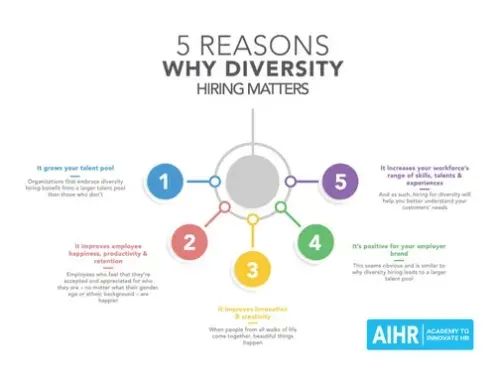
Are you Investing in a Diverse Workforce?
With DE&I on the agenda for both employers and employees, companies around the world are focusing on developing their diverse recruiting strategies, therefore, good practice of hiring candidates under a process that is bias free is paramount.
Diverse recruitment should be aimed on finding the best possible candidate, regardless of a person’s background, and with equal opportunity given. Having diverse teams can contribute to newer and more varied ideas, resulting in companies being more innovative, creative and, overall, achieving better results.
It's also important to note that diversity in the workplace is not solely focused on business results and performance, but equally on building teams from qualified candidates, irrespective of their age, gender, background, race, religion or sexual orientation - this is long overdue and a step towards true equality in the workplace.
Diverse recruitment has many tangible benefits for performance and productivity, such as a broader range of skillsets, increased language and cultural awareness, and a more varied candidate pool.
“Research from McKinsey & Company shows that the most diverse companies are also some of the most profitable: those in the top quartile for gender diversity on their executive teams were 21% more likely to experience above-average profitability than companies in the fourth quartile. As far as cultural diversity goes, companies in the top quartile were 33% more likely to have higher profitability than their less diverse counterparts.”
https://www.moonworkers.co.uk/blog/5-reasons-why-a-diverse-workforce-is-beneficial?gclid=Cj0KCQjwjvaYBhDlARIsAO8PkE31_jm8-HoPOUQGnEg7sHGlB8KR652Gys0JsIYi8l5k3aim2cxfaQYaAqc8EALw_wcB
When recruiting with a diverse strategy, it’s crucial to measure the metrics of your hiring process. Understanding what your company is aiming to achieve in its recruitment and appealing to a diverse demographic is an effective way to encourage a wide range of applications.
So, how can you encourage such applications?
Tips on diverse recruitment
- Audit your previous vacancies and make the necessary changes that will appear to a wider, more diverse audience - make sure the language used isn’t masculine, feminine or aimed towards a certain qualification level, seek to be more inclusive in the wording so as the vacancy can appeal to candidates with different backgrounds
- Source candidates from different platforms - LinkedIn is one of the best tools to use for sourcing, but do not rely on the same channel to find your diverse candidates, as simply using the same platform, time and time again, can result in a similar talent pool and potentially lack in diversity
- Ensure there are equal opportunities at screening - are the applications you receive anonymous? Are your pre-screening methods blind? Does your ATS system have the technology to flag or filter specific skills and experience? All the above will help you to remain free from bias throughout the recruitment selection process
- Boost your employer branding - displaying your employer brand that naturally values its people and opinions from all backgrounds can be appealing to diverse candidates
- Review your policies – company policies that appeal to a wide range of people demonstrate that diversity is valued and embraced as part of the company culture
Diversity recruitment is based on talent and merit, encompassed with ensuring measures are in place to reduce bias when selecting the right candidate. To ensure you have a strong diverse recruitment strategy, do take the above into consideration.
We have noted a significant increase in payroll vacancies, particularly within the manufacturing and company software development industry over the past three months. These larger, multi-national companies have found such roles more difficult to recruit for, thus turning to external support.
If you require recruitment support for your difficult HR roles, contact our international Associate Director, Katie Insley, on [email protected] or +31 20 241 73 66, who can discuss with you the services she has provided to previous clients and how she can support you with your recruitment needs.

The Future of Work and what this means for DE&I
As we move through another quarter, we have seen continued changes across HR. Again, HR leaders are left wondering how they can attract and retain top talent.
The Future of Work is the topic everyone is talking about, whether that be for more flexible/hybrid working models, or clear development and succession plans to attract more diverse and inclusive employees.
Organisations will face increased competition for talent; this will make hiring employees challenging and will push businesses to:
- Offer better salaries, bonuses and benefits packages
- Focus on retention and improving employee satisfaction and engagement
- Create new talent pools for critical roles
We will start to see organisation prioritize Diversity, Equity & Inclusion more than they ever have before. We see through our network that employees now expect to see demonstrable progress, rather than goals or promises. Organisations will need to be more transparent and accountable then reporting on DE&I.
A recent Glassdoor DE&I workplace survey identified that 76% of job seekers consider a diverse workforce important when evaluating companies and job offers.
Why being inclusive matters in the recruitment process
In today’s competitive marketplace, DE&I is a means of achieving positive cultural change, while also boosting brand reputation and becoming an employer of choice – all of which help when it comes to attraction, recruitment and retention.
Besides, at a time when so many organisations are reporting employee and skills shortages, tapping into a more diverse talent pool is a no-brainer.
“If you haven’t got the best talent, you’re not going to be the best, and if you’re not representing properly the available pool of talent, then you’re missing an opportunity.”
- Alex Wilmot-Sitwell, EMEA President at Bank of America
By improving processes to accommodate a diverse workforce, organisations can improve employee experiences and boost engagement at every stage of the employee lifecycle:
- Attraction - Brand reputation improves from employee, customer and stakeholder perspectives.
- Recruitment – Providing inclusive candidate journeys creates equal opportunities and allows organisations to draw from a wider talent pool.
- Onboarding – Demonstrating inclusive practices sets a first impression that encourages trust and loyalty from the off.
- Development - Productivity improves, because data shows that employees with disabilities take less time off and stay with companies for longer.
- Retention – Turnover rates drop when everyone feels included and valued.
- Offboarding – Gathering employee feedback helps provide data and insights that can be used to improve DE&I policies further.
We are keen to understand your thoughts and feedback around these topics and would welcome the opportunity to hear how diverse your employee lifecycle is and how this compares with the general market consensus.
For further discussion, please contact [email protected] to see how we can support you.

Attracting and Retaining Talent for Growth and Sustainability
What recruitment process should you look at implementing to ensure you are attracting and retaining the right candidates to help grow and sustain your business?
This question could not be more topical than it is today.
Candidates are seeking quality of life from their employment, no longer accepting the working conditions pre-2020; the “great resignation” is not a myth, but a fast-growing worldwide reality that is being fuelled by the choice available on the open market.
The continuous job vacancy growth over the past six years for the Netherlands market has been recorded across all sectors.
"The number of new vacancies subsequently rose by 400,000 to 1.4 million in 2021, reaching the highest level ever recorded. The increase was visible in all occupational classes. This is evident from new labour market figures which have been released by Statistics Netherlands (CBS)." Source: https://www.cbs.nl/en-gb/news/2022/23/more-new-vacancies-in-2021-for-all-occupations
Candidates in the Dutch market know they are in a strong position to demand a great work-life balance, choosing organisations demonstrating strong ethics and morals, inclusive directives, and clear corporate policies.
Many Netherlands based organisations offer attractive packages with education stipends and reduced hours to ensure they attract the best candidates on the market.
It is imperative for organisations to address these fundamentals, not only to attract the right level candidates, but to develop and retain your workforce to ensure growth and future success.
Do you consider your workforce your strongest asset?
Once you have addressed your internal structure to promote your organisation, you should also consider reviewing your hiring processes. Is it robust, efficient, or even fit for purpose?
Efficiency is key. Long recruitment/interview processes with multiple testing and difficult panel scenarios can hold a negative impact on your next generation workforce. It’s important to keep momentum of the interview process to ensure a successful outcome.
We hear from many candidates who have entered a difficult recruitment process and cited they have felt “stressed”, “under pressure”, “unable to deliver” and “de-valued”.
Competitors with quick, fluid decision-making processes are often the most successful in attracting and identifying the right level talent.
This hiring process is not just about an organisation considering the suitability of a candidate, but also the candidate considering the suitability of the organisation.
First impressions
Deliver an opportunity that is going to be well received; first impressions really do count:
- Write a job description that accurately reflects your hiring needs. Make it realistic and competitive, not only within the external market, but also with your internal structure.
- Highlight and promote your organisation’s internal policies.
- Define a robust recruitment process, which covers the process from application/interview to offer within a succinct timeframe.
- Provide clear feedback to all engaged with the process, even those you don’t wish to offer; negative feedback can impact the reputation of your organisation for future hiring.
- Make the hiring process enjoyable for all parties.
Growing your reputation in the market will enhance your credibility and attractiveness to invite and retain the future generation workforce you are seeking.
For more support and guidance in streamlining your hiring process, EMEA Recruitment can provide advice on delivering a robust process. If you are interested in finding out more or have any further questions please reach out to David Harper.
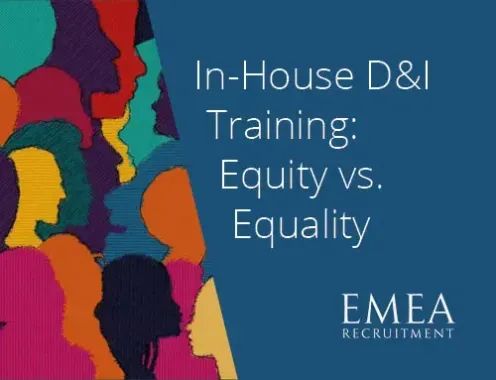
In-House D&I Training: Equity vs. Equality
The whole team at EMEA Recruitment recently took part in Equity vs. Equality training, delivered by our Ambassador, Valentina Coco.
“At the end, the key objective is to have someone on the recruiting panel who can empathise.”
Last year, Valentina conducted two in-house D&I training sessions – one on the topic of bias, the other on how to speak to our clients about D&I.
In July, Valentina explored the issue of equity versus equality, particularly from the standpoint of ethnic diversity. Globally, we still lack diverse ethnical representation in business; just 8% of managers and 4% of CEOs in Fortune 500 companies are from minority ethnic backgrounds.
Valentina explained how the pipeline for getting to senior management positions is broken for those from minority backgrounds, due partly to highly unemployment rates and lack of access to education. Even when minority candidates are hired, they can feel that they’re alienating the majority in the workplace. This is why an equitable hiring process is essential.
We looked at the difference between nationality, ethnicity and race, as well as some common and less well-known words and phrases that we may feel uncomfortable using at times.
Exploring equity and equality in more detail, we discussed why workplace policies are bad for equity and how standardised testing in the recruitment process still discriminates against marginalised groups.
To help us understand the biggest hurdles in recruiting, Valentina presented us with four challenges: societal access, bias and tokenism, the pipeline gap, and the impact of COVID-19.
Societal access refers to the lack of opportunities that minority groups may have to education, internships, entry level jobs and promotions, due to potential financial barriers and a shortage of connections.
Bias and tokenism is the objective of hiring someone based on the diversity they can bring to the team, which can damage inclusivity and retention in the long-term.
The pipeline gap must be addressed by stakeholders who are empathetic and invest in D&I, as well as through the wider culture of the business.
Minority groups and women faced a significant impact of COVID-19, for example, with a higher care load, anti-Asian sentiment and career breaks.
We ended the session by analysing three specific case studies, as well as asking Valentina our own questions and sharing our thoughts.
As always, all ideas were shared in a safe and confidential environment.
Valentina Coco is an Ambassador of EMEA Recruitment, as well as the CEO and Founder of Coco Consulting & Coaching. She trains teams to develop an inclusive working environment.

Quality vs. Quantity in the Recruitment Process - Which is Paramount?
When looking for a new role, should candidates focus on quality or quantity in the recruitment process? Sasha Gill, one of our Senior Consultants for Procurement, Supply Chain and Operations in Switzerland, explores which is paramount in a candidate-driven market…
The current recruitment market in Switzerland is candidate-driven. As a result, we are seeing an increase of job seekers being involved in multiple different recruitment processes simultaneously.
Being involved in multiple processes can be advantageous when building your personal network and for your own market-value mapping. In the current market, with recent cost-of-living increases, it is more important than ever for job seekers to benchmark their own salaries in the market. Partaking in multiple recruitment processes at the same time is one way to achieve this.
However, an argument can be made that being involved in several recruitment processes could be a disadvantage. Searching for your next career opportunity can be time consuming enough; having multiple, simultaneous processes may dilute your focus on each role and hinder your thorough research on each prospective employer.
We are keen to hear from our network whether you think quality or quantity is paramount in the recruitment process.
When it comes to searching for your next opportunity, is it quality or quantity that you aim for? Are you open to being in multiple recruitment processes at once, or do you prefer to focus your search on one opportunity at a time?
Get in touch with Sasha to let us know: [email protected]
If you’re interested in looking for a new role in Switzerland, Sasha focuses on Procurement, Supply Chain and Operations roles.
You can also take a look at the Finance & Accountancy positions we have available: https://www.emearecruitment.com/finance-and-accountancy
Or, if you’re a Human Resources professional, we may have a role available that interests you: https://www.emearecruitment.com/human-resources-

Q2 2022: Netherlands HR Recruitment Market Insights
As we enter Q2, we have continued to see a buoyant recruitment market across Human Resources and significant turnover within HR teams. As businesses continue to grapple with this challenge, attention has turned to retention strategies and how businesses can keep their talent engaged.
We ran a poll in January asking our network what the most important factor was when looking to retain top talent, with the following options: improved reward package, visible career path, leadership style and culture, and company sustainability agenda.
There was a strong leaning towards leadership style and culture, with many commenting that, if this fails, a business will not be able to achieve the other factors, and that leaders need to listen, hear and act upon the changing needs and desires of their workforce.
There is the feeling that autocratic leaders will lose out to inclusive leaders that show their humility, as well as high levels of emotional intelligence, which has been a critical skill as they’ve been asked to lead virtual and often highly stressed teams over the last couple of years.
Others commented that a focus on work/life balance and wellbeing remained a top trend, and that ensuring interventions were put in place to prevent burnout were essential.
Latest Events
Last quarter, Katie Insley, Associate Director for HR recruitment in the Netherlands, hosted a virtual Q&A session with Bianca Eder, Global Head of TA for Upfield, and Koos Wurzer, Global Head of Employer Brading for Danone.
They shared their thoughts on how the world of Talent Acquisition has evolved with the development of technology and AI. Katie agrees that, while new technologies can streamline processes and hopefully contribute to a positive candidate experience, they can’t, at this stage, substitute the human touch that is still such an important part of the recruitment process.
They discussed the importance of a strong employer brand and Koos shared some great tips on how this can be tackled, especially in an international, multi-cultural environment.
They also discussed that businesses are now having to, more than ever, sell themselves and what they can offer the candidate if they were to join. Hybrid and flexible working arrangements remain high on the candidate wish list, as well as competitive packages and wellbeing initiatives.
We’re always keen to hear from our network about topics you’d like to be covered in future events, so please do reach out if you have suggestions and ideas to share.
If you’d like to see the full session, you can follow this link: https://youtu.be/R9lw3u06ywA

EMEA podcasts
The EMEA Recruitment podcast welcomes guests from across our network and beyond to share their career journeys, advice, and inspirational stories.





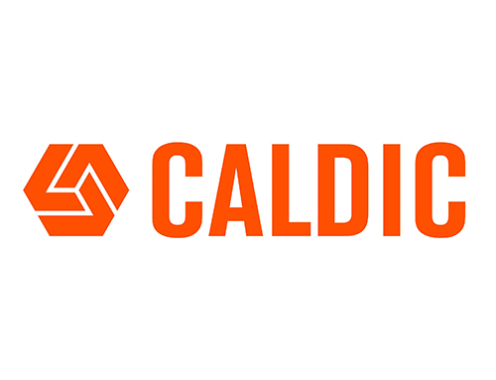

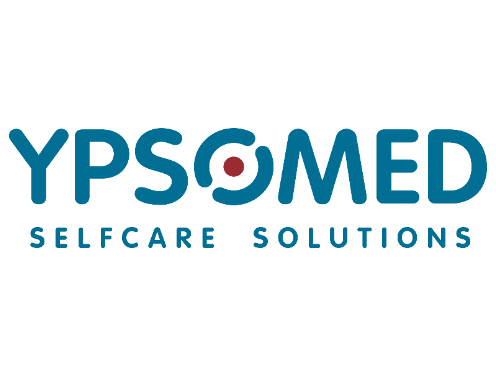
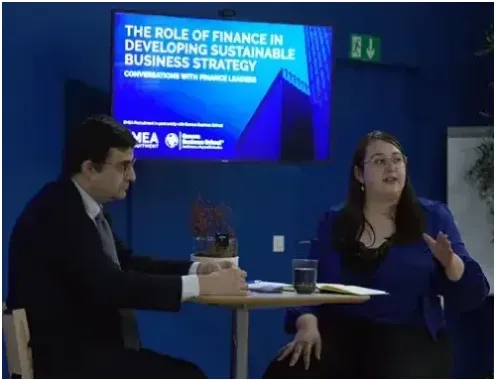
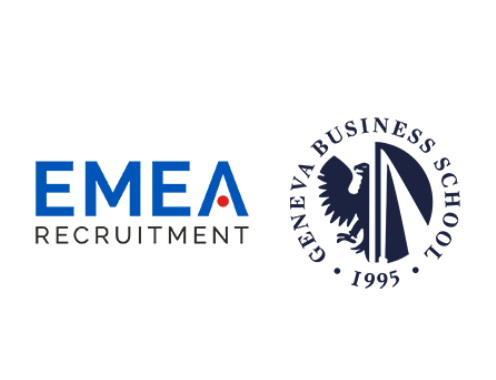



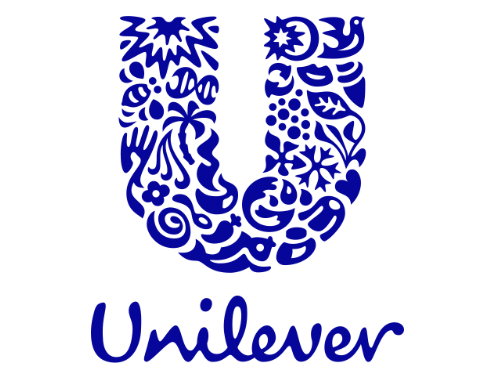

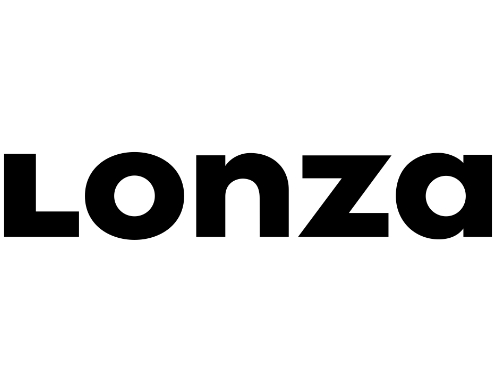

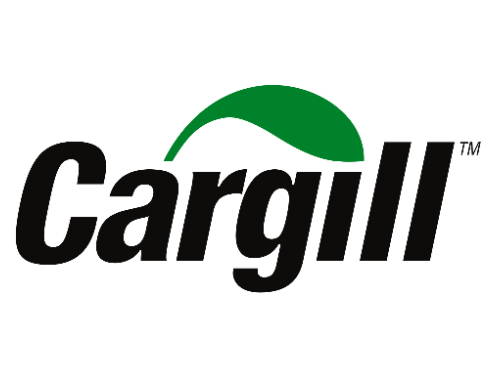
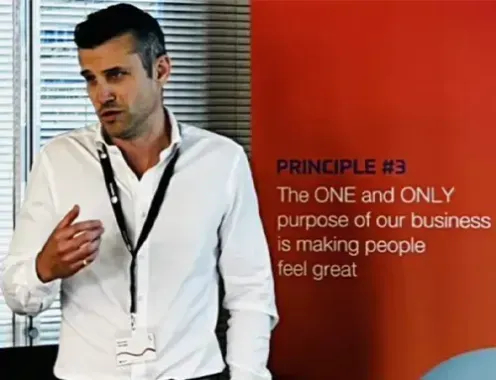
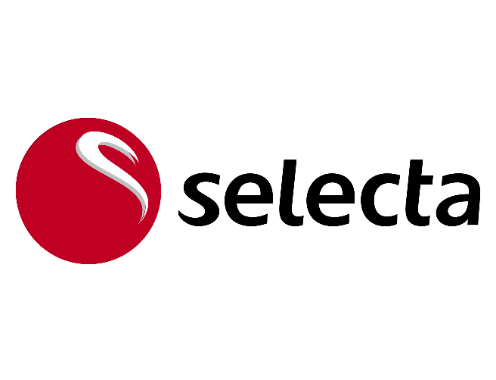

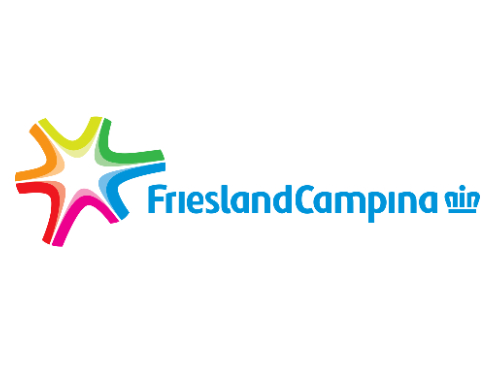


You can also use your social account to sign in. First you need to:
Accept Terms & Conditions And Privacy Policy